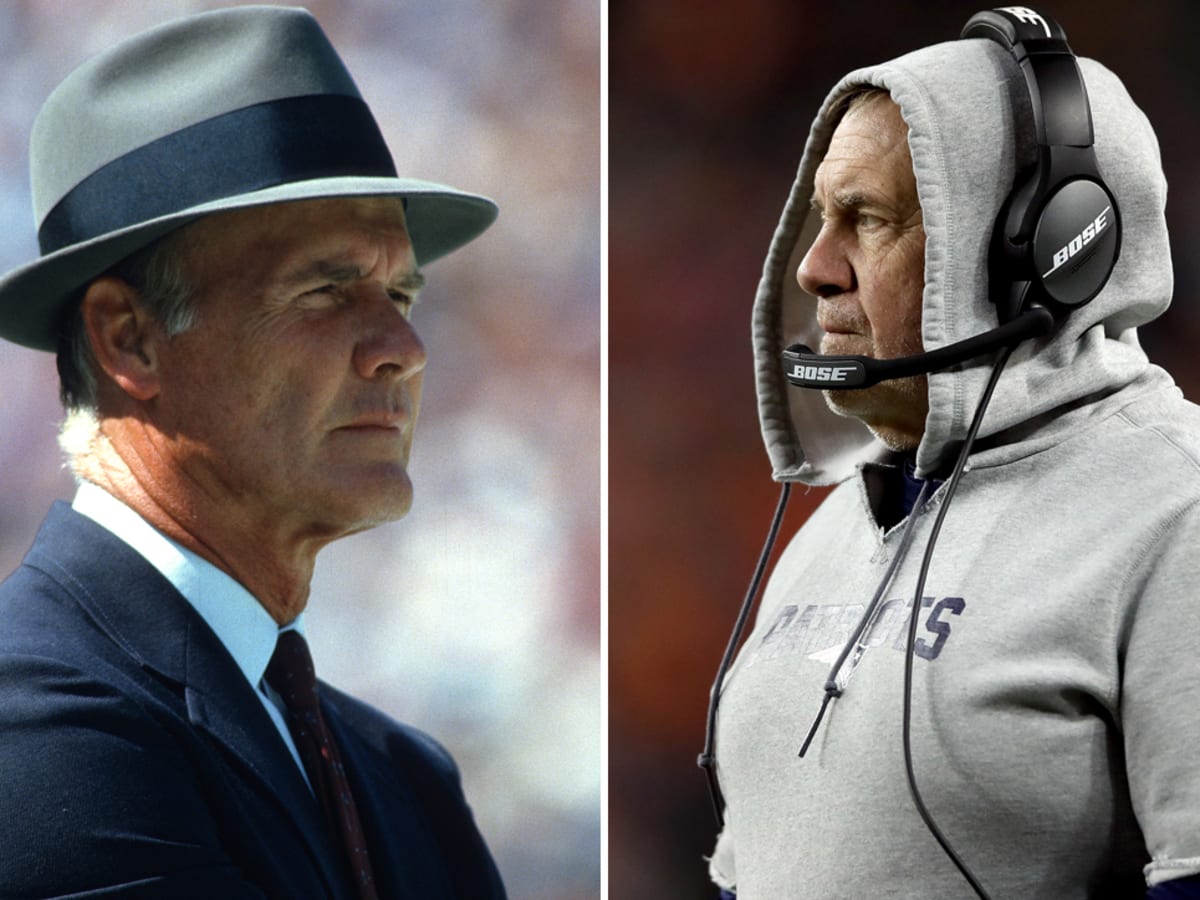Hat vs. Hoodie: Patriots' Belichick Following Tom Landry's Awkward Exit From Cowboys?
We've seen how this movie ends, and it's a cringe-worthy final scene ... then with Tom Landry; now with Bill Belichick.
Should Belichick's New England Patriots lose to the New York Jets in Sunday's regular-season finale at Gillette Stadium, his potential "Foxboro Farewell' will come equipped with a dubious record. With a 178th career defeat, he would tie Landry for the most overall coaching losses in NFL history.
And that's just the beginning of the similarities between the two coaching giants, and their potentially similar rides off into the Hall-of-Fame sunset. As he characteristically grinds in preparation of the Jets and also covers his bases in advance of Monday's scheduled summit with owner Robert Kraft, here's hoping Belichick scouted the X's and O's of Landry's awkward exit from the Dallas Cowboys.
Call this the parable of the Hat and the Hoodie.
Jets' Robert Saleh In Awe of Patriots' Belichick: 'Transcended NFL'
Both men grew up in military backgrounds: Landry flew bomber missions for the U.S. Army in World War II; Belichick's father coached at Navy for 30 years and Bill essentially grew up on the campus in Annapolis, Maryland.
Both cut their coaching teeth in select company on the defensive side of the football for the New York Giants: Landry in the 1960s as the defensive coordinator opposite an offensive coordinator named Vince Lombardi; Belichick in the 1980s as the defensive coordinator for head coach Bill Parcells.
Landry guided the Cowboys for 29 years, leading them to two Super Bowls in the 1970s and winning two Coach of the Year awards along the way. He was the epitome of class and consistency, posting an NFL-record 21 consecutive winning seasons. Belichick has been the face of the Pats for 24 years, leading them to six Super Bowls while winning two Coach of the Year awards. New England had a 19-season winning streak under him, third-longest.
There are, however, some stark contrasts in the two icons.

With his multiple formations, creative screen passes and innovative shotgun, Landry is considered one of the brilliant offensive minds in the history of football. Belichick is widely regarded as the sport's greatest defensive tactician.
Landry always dressed in a suit, tie and Fedora hat; Belichick in his trademark sweatshirt hoodie.
Nonetheless, the final acts of their Canton-bound careers are eerily similar.
After winning Super Bowl XII in the 1977 season, Landry coached 11 more years without a title. In the wake of Hall-of-Fame quarterback Roger Staubach's retirement, his Cowboys lost three consecutive NFC Championship Games and over his last six seasons he didn't win a single playoff game. Belichick's Patriots won their last Super Bowl in the 2018 season and since Hall-of-Fame quarterback Tom Brady left they are 29-38 without a playoff win.
In retirement, Landry admitted that late in his career he struggled to connect with players because of "sociological changes." See: Thomas "Hollywood" Henderson. A recent report by FS1 host Colin Cowherd claims modern players (and assistant coaches) are no longer drawn to Belichick's once-alluring substance-over-style dogma. Think: Jack Jones.
In 1988 Landry's Cowboys finished 3-13. With a roster that was either too old (Ed "Too Tall" Jones and Everson Walls), too young (Michael Irvin and Nate Newton) or simply too bad (Steve Pelluer), they lost their season finale to the Philadelphia Eagles, 23-7, at Texas Stadium. Though both Cowboys owner Bum Bright and general manager Tex Schramm privately knew it was time for the 64-year-old Tom to go - the game, and the players who played it, had indeed passed him by - they didn't dare shove out a living legend and Texas treasure.
Landry, who was under contract through 1989, would have to be dragged out kicking and screaming.
"'I could step down tomorrow, and I don't think I would go hungry," Landry said in the middle of the disastrous 1988 season. "We agreed on what we wanted to do before the season began. But if that changes, then it changes. I would never re-evaluate to retire or not to retire in the middle of the season. I knew we were going to hit a spot like this. We are a very inexperienced team."
Instead of pulling the trigger on a transaction he knew would eternally haunt him, Bright sold the team Arkansas oil man Jerry Jones.
Though the Pats are 4-12 with a first-round bust of a quarterback in Mac Jones and a roster embarrassingly void of offensive playmakers, there is no indication that Kraft has an inkling of selling the Patriots to avoid firing Belichick. In fact, last October he claimed "Never in my lifetime will I sell." But as Landry merely believed he needed time to regain his fastball, Belichick too seems to think he has another Super Bowl in him.
Meanwhile, fans, media, the ghost of Landry and even Belichick's players realize it's time for him to walk away gracefully from One Patriot Place while he still can.
Said long-time Pats captain Matthew Slater of Sunday's game: "I'm sure it will be emotional for us ... for obvious reasons."
Fox TV Host: Eagles Should Fire Sirianni, Hire Patriots' Belichick!
Jones hired Jimmy Johnson, fired Landry face-to-face on a golf course in Austin, used a high draft pick on quarterback Troy Aikman, and went on to win three Super Bowls in four years in the 1990s. The old coach triumphantly returned for a "Tom Landry Day" parade through Dallas in 1989, was inducted by Jones into the team's Ring of Honor in 1993, and his statue greets fans today at AT&T Stadium.
In Foxboro the lofty draft pick and sizeable salary-cap space looms, but the script remains scattered about. Here's hoping Belichick's grim future doesn't taint his glorious Patriots' past.
Be it Landry or Belichick, there is no easy - or right - way to usher out a legend. Their legacy will live forever. But, at some point, the losing has to stop.
